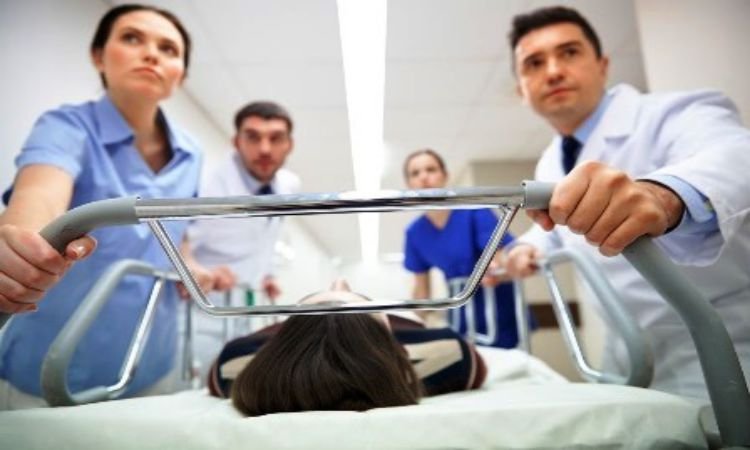 Medical accidents are defined as any unintended or unexpected injury or illness that occurs during medical care. They can occur due to various reasons, like mistakes made by healthcare professionals, equipment malfunctions, or problems within the healthcare system. Though relatively uncommon, medical accidents can have severe consequences for patients and their loved ones.
Medical accidents are defined as any unintended or unexpected injury or illness that occurs during medical care. They can occur due to various reasons, like mistakes made by healthcare professionals, equipment malfunctions, or problems within the healthcare system. Though relatively uncommon, medical accidents can have severe consequences for patients and their loved ones.
According to a study conducted in 2017 by James G. Anderson and Kathleen Abrahamson, medical accidents rank as the third leading cause of death in the United States, resulting in more than 251,000 fatalities annually. Additionally, John Hopkins Medicine mentioned that medical errors do not get the funding and attention they deserve. This is especially true considering all the effects of medical accidents on patients.
The lasting effects of medical accidents can be diverse and substantial. Patients may endure physical issues like pain, disability, or ongoing illnesses. They may also face emotional challenges such as post-traumatic stress disorder (PTSD), anxiety, and depression. Furthermore, medical accidents can create significant financial and social burdens for patients and their families.
Physical Effects of Medical Accidents
The most common physical effects of medical accidents include:
1. Pain:
Pain is a common and distressing symptom experienced by many patients who have undergone medical accidents. It can stem from various factors, such as nerve, muscle, or bone injuries, as well as chronic medical conditions that develop as a result of the accident.
2. Disability:
Disability is another prevalent long-term outcome of medical accidents. Patients may encounter physical or cognitive limitations that hinder their ability to work, carry out everyday tasks, or live autonomously.
3. Disfigurement:
Medical accidents can also lead to lasting effects on a person’s appearance. Patients might end up with scars, burns, or other physical changes that can deeply affect them emotionally and socially.
4. Chronic Illness:
Another frequent long-term consequence of medical accidents is the development of chronic illnesses. Patients could acquire ongoing health issues like infections, heart problems, or cancer as a result of their injuries.
5. Death:
Sadly, the most devastating long-term outcome of medical accidents is death. Some patients don’t survive their injuries, while others pass away due to complications arising from their injuries.
Psychological Effects of Medical Accidents
The psychological impact of medical accidents often includes:
1. Post-traumatic stress disorder (PTSD):
PTSD is a mental health condition that can develop following a traumatic event like a medical accident. Symptoms may involve nightmares, flashbacks, anxiety, and sleep disturbances.
2. Anxiety:
Many patients experience heightened anxiety regarding their health, future, and the healthcare system after a medical accident.
3. Depression:
Medical accidents can lead to feelings of depression related to the injuries sustained, losses experienced, and the disruption of their previous way of life.
4. Anger:
Patients may also grapple with anger, directed towards themselves, healthcare professionals involved in their care, or the healthcare system as a whole.
5. Guilt:
Feelings of guilt are common among patients who have experienced medical accidents, often stemming from their injuries, the strain placed on their families, or survivor’s guilt if others did not survive similar circumstances.
Social and Financial Effects of Medical Accidents
Medical accidents can have significant social and financial consequences for patients and their families.
One common financial impact is the loss of income. When patients can’t work due to their injuries or ongoing illnesses, it can create financial difficulties for both patients and their families. Another financial consequence is the increase in medical expenses. Patients often need continued medical care, which can be costly.
In terms of social effects, the loss of independence is common. When injuries or chronic illnesses limit a patient’s independence, it can be emotionally and socially challenging for both the patient and their family. Furthermore, medical accidents can strain relationships. Coping with the aftermath of a medical accident can place stress on the relationships between patients and their families.
Support for Victims of Medical Accidents
There are a number of strategies that can be implemented to prevent medical accidents. These include:
- Improving communication between healthcare professionals and patients
- Implementing safety protocols and checklists
- Investing in training and education for healthcare professionals
- Creating a culture of safety in healthcare organizations
There are also a number of resources available to help patients and families cope with the long-term effects of medical accidents. These resources include:
- Support groups
- Financial assistance programs
- Legal assistance
Getting in contact with support groups and financial assistance programs may help victims deal with their accidents emotionally and financially. Meanwhile, getting assistance from a medical malpractice lawyer may help when you want to file a claim to earn compensation for an accident you were involved in. Whatever it may be, do not be afraid to look to these resources for help.
Medical accidents can have devastating long-term effects on patients and their families. It is important to be aware of the risks of medical accidents and to take steps to prevent them. If you or a loved one has been affected by a medical accident, there are resources available to help you cope with the long-term effects.




